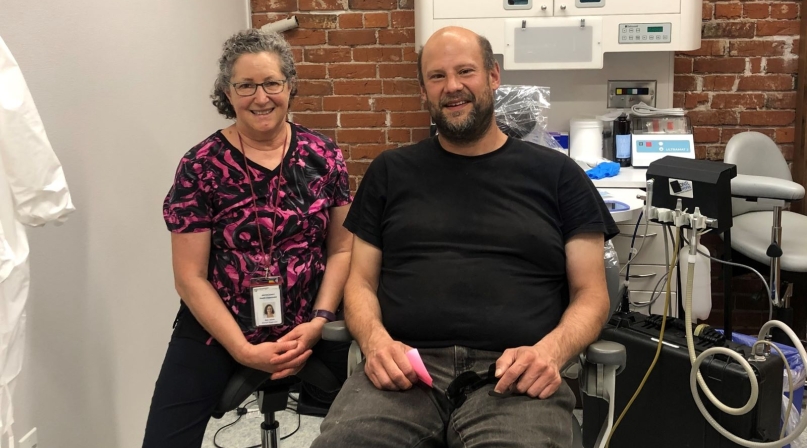Counties tackle dental care for the underserved

Key Takeaways
For people struggling with substance use disorder and homelessness, dental care often gets pushed aside, due to both a lack of access to care and it simply not being a priority. The Community Health Centers of Linn and Benton County, Ore. are working with the recovery support service Communities Helping Addicts Negotiate Change Effectively (C.H.A.N.C.E.) to alleviate those barriers through its on-site dental program, which can see up to seven patients a day.
C.H.A.N.C.E. peer mentor Curtis Parke, who has lived experience with substance use disorder, helps coordinate the dental program. Growing up, Parke experienced housing insecurity, sometimes living in tents with his parents, and went years without any dental care. He emphasized the importance of the dental space existing at C.H.A.N.C.E., where the counties’ homeless population receives other services, including meals, counseling and assistance with housing and employment.
“Having this safe place that they’re already coming into and being able to house that kind of service is just amazing,” Parke said. “Because when you’re [homeless with substance use disorder or SUD], you don’t keep track of your appointments, you don’t even know what day it is.
“I wish that I would have had something like this when I was out there.”
Parke said that it’s common for people experiencing homelessness and SUD to get into a cycle with substances that worsens their dental hygiene, which can cause a reliance on using them to ease the pain instead of getting needed dental care.
Substance use covers dental pain
“You just don’t care,” Parke said. “Having that dental pain, you do ‘use more’ to be able to cover that up. You strive to get whatever you can to take away that pain, which is never healthy.
“Going to emergency rooms or urgent care or something like that, it just doesn’t work. They give you some antibiotics, the pain goes away for a little while and you never go to the dentist appointment because you’re out using and stuff, so having them come here where they’re already safe, they can just walk in and be like ‘Oh, the dentist is here. Can I see you guys?’ It’s an immediate thing, while it’s right there on their mind, they don’t have to have an appointment.”
A team, consisting of an expanded practice hygienist and expanded functions dental assistant with the Community Health Centers, takes X-rays of each patient’s teeth, does an initial assessment and cleaning.
They then send the patient’s information out for a telehealth review, where a dentist determines recommended treatment, according to Vanessa Rabine, the outreach dental program coordinator of the Community Health Centers of Linn and Benton counties.
Elderly homeless report oral pain
The program avoids what Rabine refers to as “Band-Aiding with antibiotics” by connecting the patients with follow-up dental visits to receive their recommended care, which C.H.A.N.C.E. helps coordinate transportation for. Starting next year, the program will also add an in-house dentist to provide basic restorative care once a month. Community partner Interdent donated the necessary dental equipment to expand the program’s services.
In a study of older homeless adults conducted by the Benioff Homelessness and Housing Initiative, more than half of the participants were missing at least half of their teeth and reported oral pain in the past six months, with nearly 29% reporting that oral pain prevented them from eating and nearly 21% reporting that the pain prevented them from sleeping.
C.H.A.N.C.E.’s goal is to “care for the whole human,” and the dental program is an important extension of that work, said the organization’s director, Emma Dean.
“A couple of years ago, I was driving into work and saw an individual that I had known for years, super close to my heart, who was experiencing homelessness and addiction,” Dean said.
“I stopped, connected with him, and the thing that I could do in that moment was provide food for him. As I’m getting ready to leave to go get him some food, he starts telling me what he can eat because he doesn’t have all of his teeth and has dental pain.
“And it was a thing that I would have never thought about, paying attention to what food we’re providing for people that don’t have access to dental care — it was just a moment of realization.”
C.H.A.N.C.E. is an ideal site for the dental program not just for its convenience in offering other services at the same location, but also because of its judgment-free nature, according to Dean.
Christine Mosbaugh, the Community Health Centers’ population health and engagement manager, echoed that sentiment.
“The experience of going to an urgent care or an emergency room and the billing that will result from that, the trauma that comes from those spaces and the limited actual sort of curative healing space that that is, it’s really expensive to our system,” Mosbaugh said.
“And our hospital doesn’t have the capacity or the desire probably to want to do most of that, so these are those unique partnerships that I think start to have these ripple effects through our community.”
Samaritan Health Services also helped provide funding for dental instruments and supplies and partnerships were a key part in the program’s success, according to Mosbaugh.
“Health is an interrelated experience, and our teeth aren’t separate from the things that flow through our veins and our ability to manage pain and eat the right foods,” Mosbaugh said.
“So, it’s really great when we can identify people who are a hospital system, who have opportunities for funds or a dental company that has extra pieces that they’re looking to get into use or to reallocate somewhere, but I think what it really comes down to when I think about it is like ‘Who do we know who’s good at a thing and then what things do we need?’”
Since opening in June, the dental program has attracted people outside of C.H.A.N.C.E.’s existing clientele, according to Parke.
About 10% of people who have utilized the dental services are those who didn’t previously receive other services through the organization, but now do, he said. “It’s something that I think has turned out to be a beautiful thing,” Parke said.
“We have helped so many people.”
Resource
Serving the Underserved: Counties Addressing Poverty

Related News

Drug tracking software helps counties identify trends, save lives
Florida counties are using an artificial intelligence tool called Drug TRAC to track and report drug trends, with the aim of providing quicker outreach and saving lives.

White House Executive Order establishes national substance use disorder response
On January 29, the White House issued an Executive Order (EO) establishing the Great American Recovery Initiative, a new federal effort aimed at coordinating a national response to substance use disorder (SUD).

USDA and HHS release new dietary guidelines
On January 7, U.S. Department of Agriculture Secretary Brooke Rollins and U.S. Department of Health and Human Services Secretary Robert F. Kennedy, Jr. unveiled the new Dietary Guidelines for Americans, 2025–2030.
